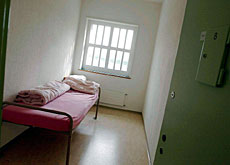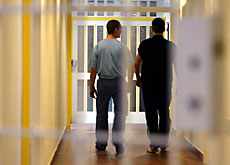Swiss prison system is a law unto itself

There is a severe shortage of high security mental hospitals in Switzerland, although cantons have been obliged to provide such centres for over 60 years.
But a revised penal code, due to come into force by 2006, should lead to the creation of new establishments for dangerous offenders with psychiatric disorders.
Swiss cantons will have ten years to comply with the new regulations.
The current penal code, dating from 1942, states only that psychiatric offenders must be incarcerated in establishments that guarantee public safety.
Until now, many cantons – particularly in French-speaking Switzerland and in Ticino – have been accommodating prisoners with psychiatric problems either in normal prisons or – in the case of less dangerous offenders – in clinics.
Security not guaranteed
“A hospital is not meant to be a prison,” said Constantin Fransiskakis, head of the Geneva Office for Prisons. “Security there is not guaranteed.”
Two prisoners who escaped from the Belle Idée psychiatric clinic in Geneva in August are still on the run.
The second option – housing offenders in prisons – is also problematic, as these are often not equipped to treat inmates with severe mental problems.
Pierre Valotton, director of canton Vaud’s prison service says that, in effect, this lack of provision leads judges in French-speaking Switzerland to flout the law. “No such institutions [for offenders with psychiatric disorders] have been built here since the Penal Code was introduced in 1942.”
Serious offenders
That is soon to change, however. At the end of August, the authorities in Geneva finally decided to extend Champ-Dollon, an overpopulated prison, while at the same building a secure unit to house serious offenders with psychiatric disorders.
There are about 15 inmates at Champ-Dollon who need special, psychiatric treatment. Most of them have been placed at the Paquerette, the socio-therapeutic part of the prison.
“Taking in these prisoners puts the prison’s staff in a delicate situation for which they are not trained,” deplored Henri Nuoffer, secretary of a panel that monitors the way the penal code is applied in French-speaking Switzerland.
The new high security unit in Geneva would be a first for the region. It would fill a gap and could also affect the types of sentences handed down to prisoners.
The German-speaking cantons have anticipated the changes to the penal code and have already made provision for serious offenders who require psychiatric treatment.
Authorities in canton Solothurn are in the process of building a centre for serious offenders with psychiatric problems.
Dangerous
This autumn, the Therapy Centre in Schache will open its doors to around 30 dangerous prisoners. Providing it gets more funding, the centre will house up to 150 prisoners by 2007.
The psychiatric clinic in Rheinau, canton Zurich, also has a high security section that can house around 12 prisoners and there are plans to expand the facilities.
Meanwhile Pöschwies prison, also in canton Zurich, has 15 cells for inmates with psychiatric problems.
There are also interim establishments for less-dangerous prisoners with psychiatric disorders in eastern Switzerland, for instance in St Jean in canton Bern. A centre in Blitzi, St Gallen, is due to open soon.
But high security establishments that can treat mentally ill prisoners do not come cheap. Looking after the 29 inmates at Schache requires 30 staff, including guards, psychiatrists and psychologists.
Cash-strapped
And since the cantons – many cash-strapped – must pay for these establishments, the pace of construction is likely to be slow, even if some cantons choose to “rent” places to others.
A further complication could arise because of differences in how prisoners are treated in French- and German-speaking regions.
In the former, inmates may be moved during their sentences. Valotton takes the view that the authorities need to be “flexible and adaptable to the evolution of the prisoner. It’s more efficient and economical.”
By contrast, in German-speaking Switzerland, the authorities prefer to keep prisoners in the same institution from the beginning to the end of their sentence, says Robert Frauchiger, who monitors how the penal code is applied in central and eastern Switzerland.
swissinfo, Anne Rubin
Article 43 of the current penal code allows offenders with psychiatric disorders to either be hospitalised or interned in a high-security centre for dangerous prisoners.
However, there is a severe shortage of such centres, leading some offenders with psychiatric disorders to be sent to ordinary prisons.
The revised penal code, due to come into force in mid-2005 or 2006, explicitly states that high-security psychiatric centres must be provided for such offenders.
Switzerland is divided into three regions for the application of the code: French-speaking and canton Ticino; eastern; and central and north.

In compliance with the JTI standards
More: SWI swissinfo.ch certified by the Journalism Trust Initiative

You can find an overview of ongoing debates with our journalists here. Please join us!
If you want to start a conversation about a topic raised in this article or want to report factual errors, email us at english@swissinfo.ch.